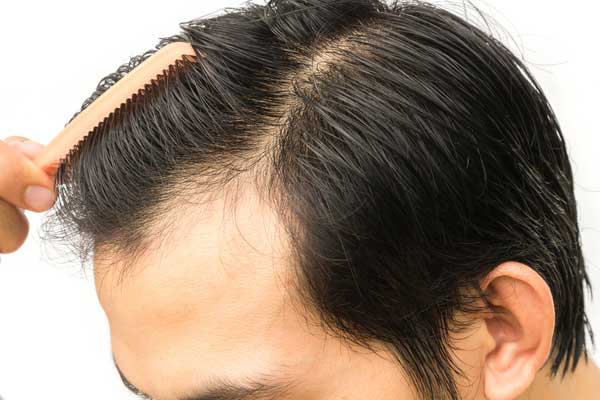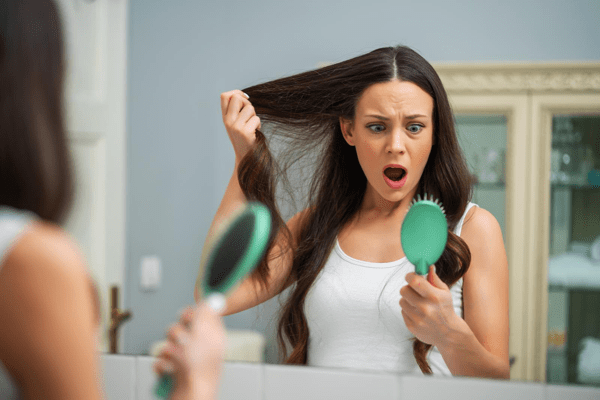Hair loss can be a devastating experience, and it’s often wise to explore natural remedies before considering medication due to potential side effects. In this comprehensive guide, we will delve into 12 powerful home remedies that not only help prevent hair loss but also promote hair regrowth. These remedies are not only effective but also cost-effective, making them a preferred choice for many. Let’s explore each remedy in detail to understand how they can contribute to maintaining a healthy, luscious mane.

1. Filter Your Shower Water to Avoid Fluoride Exposure
Your daily shower might be more damaging to your hair than you think. The fluoride in tap water can significantly contribute to hair loss and even skin issues. But fear not, you don’t need to give up showers! Instead, consider investing in a high-quality shower head filter designed to eliminate fluoride. This simple addition to your bathroom can go a long way in safeguarding your hair from the potential harm caused by this chemical.
2. Opt for Sulfate-Free Shampoos
The choice of shampoo can play a pivotal role in the health of your hair. Sulfate shampoos, commonly found in many hair care products, can strip your hair of essential proteins, leading to a host of hair-related problems. To maintain the protein balance in your hair and prevent potential damage, it’s recommended to switch to sulfate-free shampoos. By doing so, you’re taking a significant step toward ensuring the long-term health of your hair.
3. Natural Enzyme Inhibitors
Certain enzymes in the body, such as 5-alpha reductase, have been linked to hair loss. The good news is that you can use natural inhibitors to prevent their activity. These inhibitors can be applied topically and are a safe, effective way to promote hair growth. Three potent natural inhibitors are onion juice, green tea, and rosemary oil. To utilize these remedies effectively, you’ll want to dilute them as recommended and apply them to your scalp. The process is not only simple but also quite therapeutic.
4. Incorporate Zinc-Rich Foods
Zinc, an essential mineral for overall health, is also a key player in maintaining healthy hair. Many people are deficient in zinc, and this deficiency can lead to hair loss. Fortunately, there are various dietary sources of zinc that you can incorporate into your meals. Oysters, for example, are one of the richest sources of zinc. Red meat, seafood, and eggs are also excellent choices. By ensuring that your diet includes these zinc-rich foods, you can significantly contribute to healthier and stronger hair.
5. Apple Cider Vinegar Rinse
Apple cider vinegar is celebrated for its numerous health benefits, and it turns out that it’s also a valuable addition to your hair care routine. A diluted apple cider vinegar rinse can effectively cleanse your hair follicles, remove excess sebum, and restore the pH balance of your scalp. It’s important to dilute the vinegar correctly, ensuring it’s gentle on your skin and hair. With regular use, you can also enjoy the added benefit of shinier, more vibrant hair.
6. Adequate Protein Intake on Ketogenic Diet
Hair loss is a concern for some individuals following a ketogenic diet, and the culprit often lies in insufficient protein intake. To address this, it’s essential to increase your protein consumption. But that’s not all; you may also need to consider trace minerals and B vitamins to support hair health while on this diet. Trace minerals, in particular, play a vital role in promoting hair strength and overall well-being. By making these dietary adjustments, you can maintain healthy hair even while following a ketogenic diet.

7. Balance Estrogen Levels with Cruciferous Vegetables and Sea Kelp
Hormonal imbalances, particularly elevated estrogen levels, can contribute to hair loss, particularly in women. If you’re experiencing such imbalances, it’s wise to consider natural solutions. Incorporating cruciferous vegetables and sea kelp into your diet can help regulate estrogen levels. These foods contain substances that assist in hormone balance and contribute to healthier hair. By making these dietary changes, you’re addressing the root cause of your hair issues.
8. Support Thyroid Function with Selenium
A sluggish thyroid can lead to a host of health problems, including hair loss. To support your thyroid and promote hair health, it’s crucial to ensure adequate selenium intake. Foods like Brazil nuts, seafood, and sea kelp are rich sources of selenium and can be instrumental in maintaining your thyroid health. Ensuring your thyroid functions optimally is key to preventing hair loss, and these dietary choices can play a significant role in achieving that.
9. Manage Stress and Increase Vitamin D Intake
Stress, both emotional and physical, can wreak havoc on your hair health. Chronic stress can lead to elevated cortisol levels, which, in turn, can damage hair proteins. To tackle this, you need to address stress management. Engaging in regular physical activity, getting adequate sleep, and managing emotional stress can make a significant difference. Additionally, increasing your vitamin D intake, either through sunlight exposure or supplements, can help reduce stress levels naturally. Vitamin D, similar to cortisol, has anti-inflammatory properties, making it an essential component of your stress management and hair care routine.
10. Harness the Power of Silica
Silica, a lesser-known mineral, plays a crucial role in promoting hair strength and growth. While it may not be as widely discussed as other minerals, it’s a valuable addition to your dietary choices. Many spring waters, particularly silica-rich bottled waters, are abundant sources of this mineral. By opting for natural spring water or silica-rich bottled water, you can give your hair the support it needs to grow stronger and healthier.
11. Address Hair Loss in Polycystic Ovarian Syndrome (PCOS) with a Ketogenic Diet and Intermittent Fasting
Hair loss is a common concern among individuals with Polycystic Ovarian Syndrome (PCOS), and the underlying issue often lies in insulin levels. By adopting a low-carb ketogenic diet and incorporating intermittent fasting into your routine, you can take steps to reduce insulin levels. This can have a positive impact on PCOS-related hair loss. When insulin levels are balanced, androgen levels are also regulated, leading to healthier, thicker hair.
12. Boost Biotin and Gut Health with Sauerkraut
Biotin, a vital B vitamin, is essential for hair health, as it plays a role in the development of proteins that give hair its structure. What many people don’t realize is that biotin is also produced by gut bacteria. When your gut microbiome is compromised, biotin production can decrease, potentially leading to hair issues. To combat this, consider incorporating sauerkraut into your diet. Sauerkraut is a probiotic-rich food that enhances gut microbiome health, increases biotin production, and supports the growth of healthier hair. Additionally, sauerkraut provides ample vitamin C, which is essential for collagen and keratin production. By making sauerkraut a regular part of your diet, you’re promoting a healthy gut and, consequently, healthier hair.
Conclusion
Hair loss can be distressing, but natural remedies offer effective, safe, and cost-effective solutions without the potential side effects of medications. By incorporating these 12 home remedies into your routine, you can not only prevent hair loss but also promote regrowth, resulting in a fuller, healthier head of hair.
